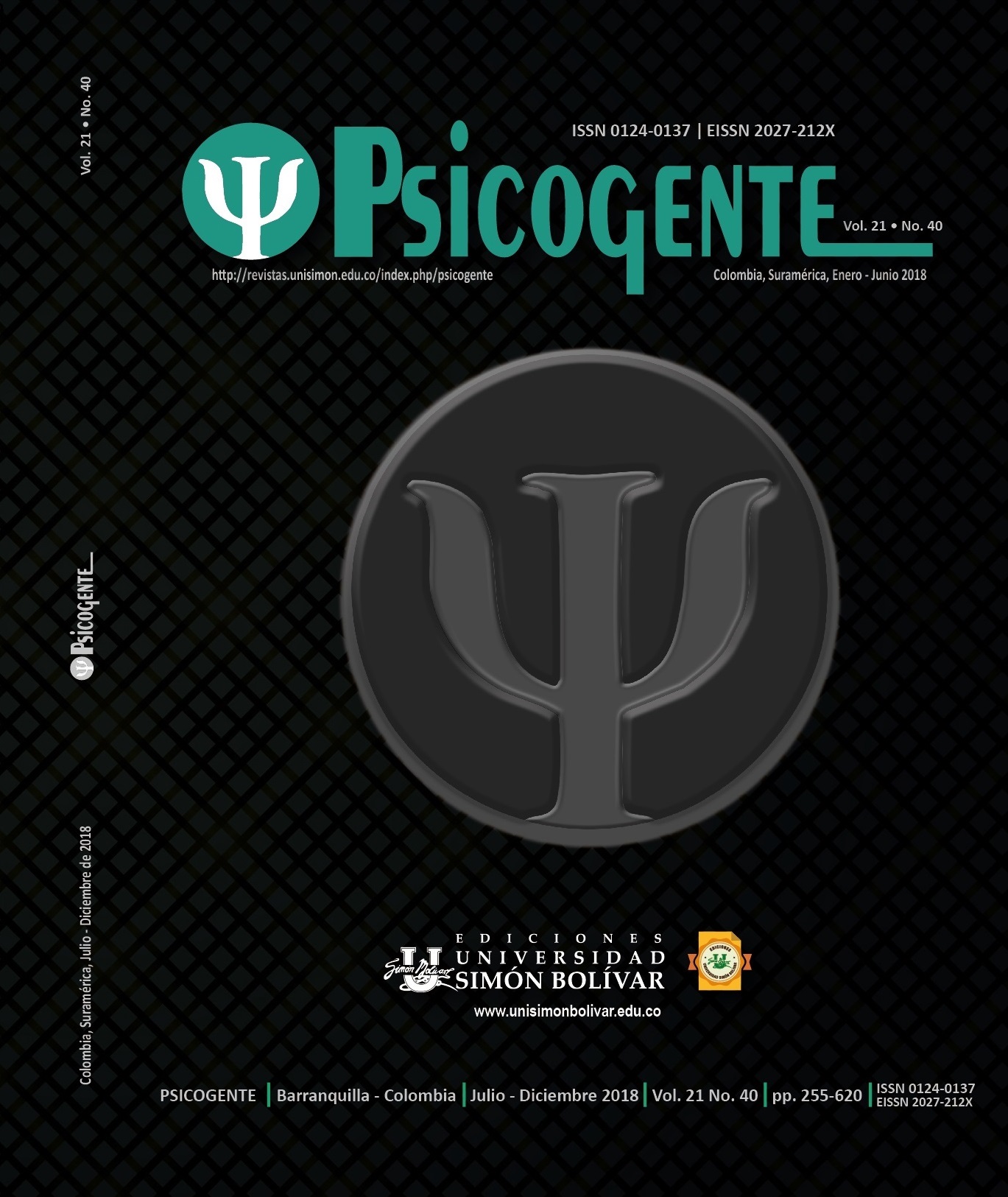Relación entre el apoyo organizacional percibido y el engagement laboral en trabajadores mexicanos
Relationship between perceived organizational support and work engagement in mexican workers
DOI:
https://doi.org/10.17081/psico.24.45.4084Palabras clave:
apoyo organizacional percibido, engagement laboral, sector de servicios, mexicanos.Resumen
Introducción: El apoyo organizacional y el engagement laboral son elementos importantes alineados con la perspectiva psicológica de la salud ocupacional. La comprensión de la interacción entre ambas variables en contexto poco explorado como lo es México y Latinoamérica genera un aporte interesante para su análisis.
Objetivo: Analizar la relación entre el apoyo organizacional percibido y el engagement laboral en trabajadores mexicanos.
Método: Diseño transversal y correlacional fue empleado en el estudio. Se realizó un análisis de regresión con los datos obtenidos del Cuestionario de Apoyo Organizacional Percibido (SPOS) y del Utrecht Work Engagement Scale (UWES) en sus versiones cortas y en español. El muestro fue por conveniencia y consistió en 292 trabajadores mexicanos del sector terciario.
Resultados: El análisis de correlación de Spearman mostró una correlación significativa, pero débil, entre una dimensión del apoyo organizacional percibido (satisfacción de las necesidades socioafectivas) y dos dimensiones del engagement: vigor (rho = 0.33, p < 0.01) y dedicación (rho = 0.28, p < 0.01).
Conclusiones: La evidencia encontrada no sostiene una relación importante entre ambas variables a diferencia de estudios anteriores, pero esos fueron realizados en contextos distintos al latinoamericano y algunos relacionan otras variables. Por ello se propone ahondar en la investigación de la relación del apoyo organizacional percibido con el engagement considerando otras variables como mediadoras.
Descargas
Citas
Abd El-Aty, Y., & Deraz, A. (2018). The Influence of Perceived Organizational Support and Employee Advocacy on Organizational Commitment in Hotels. International Journal of Heritage, Tourism and Hospitality, 12(1), 155–170. https://doi.org/10.21608/ijhth.2018.31505
Aktar, A., & Pangil, F. (2017). The Relationship between Employee Engagement, HRM practices and Perceived Organizational Support: Evidence from Banking Employees. International Journal of Human Resource Studies, 7(3), 1. https://doi.org/10.5296/ijhrs.v7i3.11353
Alvi, A. K., Abbasi, A. S., & Haider, R. (2014). Relationship of Perceived Organizational Support and Employee Engagement. Sci.Int.(Lahore), 26(2), 951–954. http://www.sci-int.com/pdf/657470018951-954--KHALIQ%20ALVI--SS--.pdf
Armeli, S., Eisenberger, R., Fasolo, P., & Lynch, P. (1998). Perceived organizational support and police performance: The moderating influence of socioemotional needs. Journal of Applied Psychology, 83(2), 288–297. https://doi.org/10.1037/0021-9010.83.2.288
Arshadi, N., & Hayavi, G. (2013). The Effect of Perceived Organizational Support on Affective Commitment and Job Performance: Mediating Role of OBSE. Procedia- Social and Behavioral Sciences, 84, 739–743. https://doi.org/10.1016/j.sbspro.2013.06.637
Aubé, C., Rousseau, V., & Morin, E. M. (2007). Perceived organizational support and organizational commitment. Journal of Managerial Psychology, 22(5), 479–495. https://doi.org/10.1108/02683940710757209
Bakker, A. B., & Demerouti, E. (2007). The Job Demands‐Resources model: state of the art. Journal of Managerial Psychology, 22(3), 309–328. https://doi.org/10.1108/02683940710733115
Bakker, A. B., Demerouti, E., & Verbeke, W. (2004). Using the job demands-resources model to predict burnout and performance. Human Resource Management, 43(1), 83–104. https://doi.org/10.1002/hrm.20004
Bakker, A. B., Schaufeli, W. B., Leiter, M. P., & Taris, T. W. (2008). Work engagement: An emerging concept in occupational health psychology. Work & Stress, 22(3), 187–200. https://doi.org/10.1080/02678370802393649
Biswas, S., & Bhatnagar, J. (2013). Mediator analysis of employee engagement: Role of perceived organizational support, p-o fit, organizational commitment and job satisfaction. Vikalpa, 38(1), 27–40. https://doi.org/10.1177/0256090920130103
Bogler, R., & Nir, A. E. (2012). The importance of teachers’ perceivedorganizationalsupport to job satisfaction. Journal of Educational Administration, 50(3), 287–306. https://doi.org/10.1108/09578231211223310
Bravo-Yáñez, C., & Jiménez-Figueroa, A. (2011). Bienestar psicológico, apoyo organizacional percibido y satisfacción laboral en funcionarios penitenciarios de Chile. Revista Española de Sanidad Penitenciaria, 13(3), 91–99. https://doi.org/10.4321/s1575-06202011000300004
Caesens, G., & Stinglhamber, F. (2014). The relationship between perceived organizational support and work engagement: The role of self-efficacy and its outcomes. Revue Europeenne de Psychologie Appliquee, 64(5), 259–267. https://doi.org/10.1016/j.erap.2014.08.002
Camacho, C., & Arias, L. (2012). Satisfacción, Apoyo y Compromiso en Profesores Mexicanos. Revista Interamericana de Psicología Ocupacional, 31(2), 120–127. http://revista.cincel.com.co/index.php/RPO/article/view/131
Cankaya, S. (2009). A comparative study of some estimation methods for parameters and effects of outliers in simple regression model for research on small ruminants. Tropical Animal Health and Production, 41(1), 35–41. https://doi.org/10.1007/s11250-008-9151-4
Castro, L., De León, C., Acevedo, J., & Ramírez, C. (2018). Resilience Processes, Engagement and Emotional Competencies, in Professionals Attending Elder People in Violence Situations in Saltillo, Coahuila and Monterrey, Nuevo León, Mexico. Actualidades En Psicología, 32(125), 33–50. https://doi.org/10.15517/ap.v32i125.32528
Claudia, M. (2018). The influence of perceived organizational support, job satisfaction and organizational commitmenttoward organizational citizenship behavior (A Study of the Permanent Lecturers at University of Lambung Mangkurat, Banjarmasin). Journal of Indonesian Economy and Business, 33(1), 23. https://doi.org/10.22146/jieb.17761
Contreras, C. A. (2015). Determinación del nivel de Engagement laboral en trabajadores de una planta de producción de petróleo y gas costa afuera en México. Ciencia & Trabajo, 17(52), 37–42. https://doi.org/10.4067/S0718-24492015000100008
Dabke, D., & Patole, S. (2014). Predicting employee engagement: Role of perceived organizational support and perceived superior support. Tactful Management Research Journal, 3 (1), 3, 1–8. https://www.academia.edu/12308399/PREDICTING_EMPLOYEE_ENGAGEMENT_ROLE_OF_PERCEIVED_ORGANIZATIONAL_SUPPORT_AND_PERCEIVED_SUPERIOR_SUPPORT
Dai, K., & Qin, X. (2016). Perceived Organizational Support and Employee Engagement: Based on the Research of Organizational Identification and Organizational Justice. Open Journal of Social Sciences, 04(12), 46–57. https://doi.org/10.4236/jss.2016.412005
De Stefano, F., Bonet, R., & Camuffo, A. (2019). Does losing temporary workers matter? The effects of planned turnover on replacements and unit performance. Academy of Management Journal, 62(4), 979–1002. https://doi.org/10.5465/amj.2017.0291
Demerouti, E., Bakker, A. B., Nachreiner, F., & Schaufeli, W. B. (2001). The job demands-resources model of burnout. Journal of Applied Psychology, 86(3), 499–512. https://doi.org/10.1037/0021-9010.86.3.499
Eder, P., & Eisenberger, R. (2008). Perceived organizational support: Reducing the negative influence of coworker withdrawal behavior. Journal of Management, 34(1), 55–68. https://doi.org/10.1177/0149206307309259
Eisenberger, R., Armeli, S., Rexwinkel, B., D.Lynch, P., & Rhoades, L. (2001). Reciprocation of POS. Journal of Applied Psychology, Vol. 86, pp. 42–51. https://doi.org/10.1037//0021-9010.86.1.42
Eisenberger, R., Cummings, J., Armeli, S., & Lynch, P. (1997). Perceived organizational support, discretionary treatment, and job satisfaction. Journal of Applied Psychology, 82(5), 812–820.
https://doi.org/10.1037/0021-9010.82.5.812
Eisenberger, R., Huntington, R., Hutchison, S., & Sowa, D. (1986). Perceived Organizational Support. Journal of Applied Psychology, Vol. 71, pp. 500–507. https://doi.org/10.1037/0021-9010.71.3.500
Ellenberg, D., & Rojas, J. (2007). Influencia de la identificación con el trabajo, la percepción de apoyo organizacional, la antigüedad, el sexo, la edad y el nivel de instrucción sobre la ciudadanía organizacional (Universidad Católica Andres Bello). http://biblioteca2.ucab.edu.ve/anexos/biblioteca/marc/texto/AAQ9997.pdf
Flores, J., & Gómez, I. (2018). Apoyo organizacional percibido y compromiso organizacional en una empresa privada de Lima, Perú. Ajayu, 16(1), 10–30. http://hdl.handle.net/10757/624012
Foley, S., Hang-yue, N., & Lui, S. (2005). The Effects of Work Stressors, Perceived Organizational Support, and Gender on Work-Family Conflict in Hong Kong. Asia Pacific Journal of Management, 22(3), 237–256. https://doi.org/10.1007/s10490-005-3568-3
Fouzia, H. A., Sayyid, S. R., Ishfaq, A., & Madiha, R. (2018). Effects of perceived organizational support on organizational citizenship behavior–Sequential mediation by well-being and work engagement. Journal of the Punjab University Historical Society, 31(2), 61–71. http://pu.edu.pk/images/journal/HistoryPStudies/PDF_Files/06_v31_2_july2018.pdf
García-Avitia, C. A., Preciado-Serrano, M. L., Ángel-González, M., & Luna Bernal, A. C. A. (2018). El desarrollo moral y la toma de decisiones éticas del psicólogo. Investigación y práctica en psicología del desarrollo, 1-28. https://doi.org/10.33064/ippd41993
Gillet, N., Huart, I., Colombat, P., & Fouquereau, E. (2013). Perceived organizational support, motivation, and engagement among police officers. Professional Psychology: Research and Practice, 44(1), 45–56. https://doi.org/10.1037/a0030066
Gilligan, C. (1985). La moral y la teoría. Psicología del desarrollo femenino. México: Fondo de Cultura Económica.
Glazer, S. (2006). Social support across cultures. International Journal of Intercultural Relations, 30, 605–622. https://doi.org/10.1016/j.ijintrel.2005.01.013
Gokul, A., Sridevi, G., & Srinivasan, P. T. (2012). The relationship between perceived organizational support, work engagement and affective commitment. AMET International Journal of Management, (2001), 29–37. http://ametjournal.com/attachment/ametjournal-4/Dev-Article-4-Gokul.pdf
Gouldner, A. W. (1960). “The Norm of Reciprocity: A Preliminary Statement”, American Sociological Review. American Sociological Review, 25 (4), 161–178. https://doi.org/10.2307/2092623
Gupta, V., Agarwal, U. A., & Khatri, N. (2016). The relationships between perceived organizational support, affective commitment, psychological contract breach, organizational citizenship behaviour and work engagement. Journal of Advanced Nursing, 72(11), 2806–2817. https://doi.org/10.1111/jan.13043
Hakanen, J. J., Schaufeli, W. B., & Ahola, K. (2008). The Job Demands-Resources model: A three-year cross-lagged study of burnout, depression, commitment, and work engagement. Work & Stress, 22(3), 224–241. https://doi.org/10.1080/02678370802379432
Halbesleben, J. R. B., & Wheeler, A. R. (2008). The relative roles of engagement and embeddedness in predicting job performance and intention to leave. Work & Stress, 22(3), 242–256. https://doi.org/10.1080/02678370802383962
Hernandez-Vargas, Clara I., Llorens-Gumbau, S., & Rodríguez-Sánchez, A. M. (2014). Empleados saludables y calidad de servicio en el sector sanitario: un estudio de caso. Anales de Psicología, 30(1). https://doi.org/10.6018/analesps.30.1.143631
Hernandez-Vargas, C., Llorens-Gumbau, S., Rodriguez-Sanchez, A. M., & Dickinson- Bannack, M. E. (2016). Validación de la escala UWES-9 en profesionales de la salud en México. Pensamiento Psicológico, 14(2), 89–100. https://doi.org/10.11144/javerianacali.ppsi14-2.veup
Henderson, M. (2020). The economic case for meeting employees’ needs. Journal of Nursing Management, 28(1), 17–23. https://doi.org/10.1111/jonm.12897
Instituto Nacional de Estadística, Geografía e Informática. (2020). Encuesta Nacional de Ocupación y Empleo (ENOE), población de 15 años y más de edad. https://www.inegi.org.mx/programas/enoe/15ymas/default.html#Tabulados
International Labour Organization. (2016). Global trends and foresight of future scenarios. Workplace Stress: A Collective Challenge, First, pp. 2–57. https://www.ilo.org/wcmsp5/groups/public/---ed_protect/---protrav/afework/documents/publication/wcms_466547.pdf
Jain, A. K., Giga, S. I., & Cooper, C. L. (2013). Perceived organizational support as a moderator in the relationship between organisational stressors and organizational citizenship behaviors. International Journal of Organizational Analysis, 21(3), 313–334. https://doi.org/10.1108/IJOA-Mar-2012-0574
Jawahar, I. M., Stone, T. H., & Kisamore, J. L. (2007). Role conflict and burnout: The direct and moderating effects of political skill and perceived organizational support on burnout dimensions. International Journal of Stress Management, 14(2), 142–159. https://doi.org/10.1037/1072-5245.14.2.142
Kahn, W. A. (1990). Psychological Conditions of Personal Engagement and Disengagement at Work. Academy of Management Journal, 33(4), 692–724. https://doi.org/10.5465/256287
Köse, A. (2016). The Relationship between Work Engagement Behavior and Perceived Organizational Support and Organizational Climate. Journal of Education and Practice, 7(27), 42–52. www.iiste.org
Kubota, K., Shimazu, A., Kawakami, N., Takahashi, M., Nakata, A., & Schaufeli, W. B. (2012). [the Empirical Distinctiveness of Work Engagement and Workaholism Among Hospital Nurses in Japan : the Effect on Sleep Quality and Job Performance]. Ciencia & Trabajo : C&T, 13(41), 152–157. http://www.ncbi.nlm.nih.gov/pubmed/26752805%0Ahttp://www.pubmedcentral.nih.gov/articlerender.fcgi?artid=PMC4705841
Leiter, M. P., & Maslach, C. (2003). Areas of worklife: A structured approach to organizational predictors of job burnout. In P. Perrewe & D. Ganster (Eds.), Emotional and Physiological Processes and Positive Intervention Strategies (3rd ed., pp. 91–134). https://doi.org/10.1016/S1479-3555(03)03003-8
Leiter, M., & Maslach, C. (1999). Six areas of worklife: a model of the organizationalcontext of burnout. Journal of Health and Human Services Administration, 21(4), 472–489. www.jstor.org/stable/25780925
Líbano, M. Del, Llorens, S., Salanova, M., & Schaufeli, W. B. (2012). About the Dark and Bright Sides of Self-efficacy: Workaholism and Work Engagement. The Spanish Journal of Psychology, 15(2), 688–701. https://doi.org/10.5209/rev_SJOP.2012.v15.n2.38883
Littlewood, H. (2003). Metanálisis del apoyo organizacional percibido y compromiso organizacional en organizaciones mexicanas. Revista Interamericana de Psicología Ocupacional, 22(2), 45–56. http://revista.cincel.com.co/index.php/RPO/article/view/46
Llorens, S., Salanova, M., & Martínez, I. (2008). Psicología de la salud ocupacional positiva: concepto y metodología para su evaluación. In J. Tous, M. A. Carrión, & F. López (Eds.), Colección Psicología de la Salud Ocupacional’ (pp. 88–108). http://www.want.uji.es/download/psicologia-de-la-salud-ocupacional-positiva-concepto-y-metodologia-para-suevaluacion/
Luthans, F., & Peterson, S. J. (2002). Employee engagement and manager selfefficacy. Journal of Management Development, 21(5), 376–387. https://doi.org/10.1108/02621710210426864
Mahon, E. G., Taylor, S. N., & Boyatzis, R. E. (2014). Antecedents of organizational engagement: Exploring vision, mood and perceived organizational support with emotional intelligence as a moderator. Frontiers in Psychology, 5(NOV), 1–11. https://doi.org/10.3389/fpsyg.2014.01322
Maslach, C., & Leiter, M. P. (2001). Job Burnout. Encyclopedia of Mental Health: Second Edition, 52, 222–227. https://doi.org/10.1016/B978-0-12-397045-9.00149-X
Mhurty, R. (2017). Perceived organizational support and work engagement. International Journal of Organizational Analysis, 3(5), 738–740. https://doi.org/10.1108/ijoa-11-2012-0627
Najeemdeen, I. S., Abidemi, B. T., Rahmat, F. D., & Bulus, B. D. (2018). Perceived Organizational Culture and Perceived Organizational Support on Work Engagement. Academic Journal of Economic Studies, 4(3), 199–208. https://ideas.repec.org/a/khe/scajes/v4y2018i3p199-208.html
Narainsamy, K., & Van Der Westhuizen, S. (2013). Work Related Well-Being: Burnout, Work Engagement, Occupational Stress and Job Satisfaction Within a Medical Laboratory Setting. Journal of Psychology in Africa, 23(3), 467–474. https://doi.org/10.1080/14330237.2013.10820653
Ocampo, R., Juárez, A., Arias, L., & Hindrichs, I. (2015). Factores psicosociales asociados a engagement en empleados de un restaurante de Morelos, México. Liberabit, 21(2), 207–219. http://www.scielo.org.pe/pdf/liber/v21n2/a04v21n2.pdf
Ojeda, M., Talavera, R., & Berreleza, M. (2016). Análisis de la relación entre compromiso organizacional y percepción de apoyo organizacional en docentes universitarios. Sistemas, Cibernética e Informática, 13(1), 66–71. http://www.iiisci.org/journal/cv$/risci/pdfs/xa510qf15.pdf
Ojeda, M., Talavera, R., & Berreleza, M. (2017). Estudio del Tipo y Grado de Compromiso Organizacional y su Relación con la Percepción de Apoyo Organizacional en la Industria Hotelera en la Ciudad de Tijuana, México. Informática, 14(3), 118–130. http://www.iiisci.org/journal/CV$/risci/pdfs/CA139ZP17.pdf
Prada-Ospina, R. (2019). Social psychological factors and their relation to work-related stress as generating effect of burnout. Interdisciplinaria, 36(2), 39–53. https://doi.org/10.16888/interd.2019.36.2.3
Rothmann, S. (2008). Job satisfaction, occupational stress, burnout and work engagement as components of work-related wellbeing. SA Journal of Industrial Psychology, 34(3). https://doi.org/10.4102/sajip.v34i3.424
Rubel, M. R. B., & Kee, D. M. H. (2013). Perceived support and employee performance: The mediating role of employee engagement. Life Science Journal, 10(4), 2557–2567. http://www.lifesciencesite.com/lsj/life1004/342_21868life1004_2557_2567.pdf
Salanova, M. (2009). Organizaciones Saludables: Una aproximación desde la Psicologia Positiva. In C. Vázquez & G. Hervás (Eds.), Psicologia Positiva Aplicada. http://www.integraorg.com/wp-content/docs/organizacionessaludables.pdf
Salanova, M., Llorens, S., & Martínez, I. M. (2016). Aportaciones Desde La Psicología Organizacional Positiva Para Desarrollar Organizaciones Saludables Y Resilientes. Papeles Del Psicólogo / Psychologist Papers, 37(3), 177–184. http://www.papelesdelpsicologo.eshttp//www.psychologistpapers.com
Salanova, M., Lorente, L., Chambel, M. J., & Martínez, I. M. (2011). Linking transformational leadership to nurses’ extra-role performance: the mediating role of self-efficacy and work engagement. Journal of Advanced Nursing, 67(10), 2256–2266. https://doi.org/10.1111/j.1365-2648.2011.05652.x
Salanova, M., Martínez, I. M., & Llorens, S. (2014). Una mirada más “positiva” a la salud ocupacional desde la psicología organizacional positiva en tiempos de crisis: Aportaciones desde el equipo de investigación WoNT. Papeles Del Psicologo, 35(1), 22–30. https://www.redalyc.org/articulo.oa?id=77830184004
Salanova, M., Schaufeli, W. B., Llorens, S., Peiro, J. M., & Grau, R. (2000). Desde el “burnout” al “engagement”: ¿una nueva perspectiva? Revista de Psicología Del Trabajo y de Las Organizaciones, 16(2), 117–134. Retrieved from https://journals.copmadrid.org/jwop/files/63236.pdf
Schaufeli, W. B., & Bakker, A. B. (2004). Job demands, job resources, and their relationship with burnout and engagement: a multi-sample study. Journal of Organizational Behavior, 25(3), 293 315. https://doi.org/10.1002/job.248
Schaufeli, W. B., Bakker, A. B., & Van Rhenen, W. (2009). How changes in job demands and resources predict burnout, work engagement, and sickness absenteeism. Journal of Organizational Behavior, 30(7), 893–917. https://doi.org/10.1002/job.595
Schaufeli, W. B., Salanova, M., González-Romá, V., & Bakker, A. (2002). The Measurement of Engagement and Burnout: a Two Sample Confirmatory Factor Analytic Approach. Journal of Happiness Studies, 3(1), 71–92. https://doi.org/10.1023/A:1015630930326
Seligman, M. (2005). La auténtica felicidad (M. Diago & A. Debrito, Trads.). In La auténtica felicidad (M. Diago & A. Debrito, Trads.). https://doi.org/10.1016/j.pse.2016.11.001
Seligman, M. E., & Csikszentmihalyi, M. (2000). Positive psychology. An introduction. The American Psychologist, Vol. 55, pp. 5–14. https://doi.org/10.1037/0003-066X.55.1.5
Shaheen, M., & Krishnankutty, R. (2018). The Mediation of Psychological Capital in the Relationship of Perceived Organizational Support, Engagement and Extra-Role Performance. International Journal of Knowledge Management, 14(4), 30–45. https://doi.org/10.4018/IJKM.2018100103
Shusha, A. A. (2013). The Role of Psychological Engagement in Relationship between Perceived Organizational Support and Withdrawal Behavior and Intentions: An Empirical Study on Small Industries in Egypt. International Journal of Business and Management, 8(16), 22–29. https://doi.org/10.5539/ijbm.v8n16p22
Soto-Pérez, M., Sánchez-García, J., & Núñez-Ríos, J. (2020). Factors to improve job performance and school effectiveness. International Journal of Educational Management, 34(5), 805–822. https://doi.org/10.1108/IJEM-07-2019-0237
Stamper, C. L., & Johlke, M. C. (2003). The Impact of Perceived Organizational Support on the Relationship Between Boundary Spanner Role Stress and Work Outcomes. Journal of Management, 29(4), 569–588. https://doi.org/10.1016/S0149-2063_03_00025-4
Sulistyo, A. R., & Suhartini, S. (2019). The Role of Work Engagement in Moderating the Impact of Job Characteristics, Perceived Organizational Support, and Self-Efficacy on Job Satisfaction. Integrated Journal of Business and Economics, 3(1), 15. https://doi.org/10.33019/ijbe.v3i1.112
Tejada, J., & Arias, F. (2004). Administración de la Calidad: prácticas organizacionales percibidas y el compromiso de los trabajadores hacia la organización. Revista Interamericana de Psicología Ocupacional, 23(2), 59–70. https://www.redalyc.org/pdf/395/39520002.pdf
Tims, M., Bakker, A. B., Derks, D., & van Rhenen, W. (2013). Job Crafting at the Team and Individual Level. Group & Organization Management, 38(4), 427–454. https://doi.org/10.1177/1059601113492421
Udovičić, M., Baždarić, K., Bilić-Zulle, L., & Petrovečki, M. (2007). What we need to know when calculating the coefficient of correlation? Biochemia Medica, 17(1), 10–15. https://hrcak.srce.hr/12855
Van der Colff, J. J., & Rothmann, S. (2009). Occupational stress, sense of coherence, coping, burnout and work engagement of registered nurses in South Africa. SA Journal of Industrial Psychology, 35(1). https://doi.org/10.4102/sajip.v35i1.423
Wang, X., Liu, L., Zou, F., Hao, J., & Wu, H. (2017). Associations of Occupational Stressors, Perceived Organizational Support, and Psychological Capital with Work Engagement among Chinese Female Nurses. BioMed Research International, 17, 1–11. https://doi.org/10.1155/2017/5284628
World Health Organization. (2010). WHO Healthy Workplace Framework and Model: Background and Supporting Literature and Practices (p. 137). p. 137. https://www.who.int/occupational_health/healthy_workplace_framework.pdf
Yongxing, G., Hongfei, D., Baoguo, X., & Lei, M. (2017). Work engagement and job erformance: The moderating role of perceived organizational support. Anales de Psicologia, 33(3), 708–713. https://doi.org/10.6018/analesps.33.3.238571
Publicado
Cómo citar
Número
Sección
Licencia
Derechos de autor 2021 Cristian Jonathan Ortiz Isabeles, César Augusto García Avitia

Esta obra está bajo una licencia internacional Creative Commons Atribución 4.0.
Desde la revista Psicogente impartimos una política de respeto con nuestra comunidad científica incluyendo a nuestros autores. Los autores tienen derecho a un trato respetuoso y atento en el proceso Editorial, que las evaluaciones de sus artículos sean justas, imparciales (para ello la revista procederá con la evaluación doble ciego) y se realicen en un tiempo razonable. Se deberá mantener la confidencialidad y los permisos para proceder con la publicación. Todo cambio solicitado por parte del comité, los pares y el Editor deberán ser explícitos y claramente justificados. Especifica que los autores/as conservarán sus derechos de autor y garantizarán a la revista el derecho de primera publicación de su obra, el cual estará simultáneamente sujeto a la Licencia de reconocimiento de Creative Commons BY que permite a terceros compartir la obra siempre que se indique su autor y su primera publicación a esta revista.
Garantizamos un proceso editorial transparente: desde las acciones de recepción del articulo hasta la validación final del mismo, se hará en comunicación constante con el autor. Las modificaciones en el estado de los artículos, así como las diversas decisiones tomadas sobre él y los tiempos de ejecución empleados se realizarán haciendo uso de la plataforma OJS y de ser necesario en contacto directo a través del correo de autores y de la revista Psicogente. Así mismo se procura la escogencia de Pares revisores idóneos: con perfiles y experiencia que lleven a una avaluación de calidad de cada documento sometido a revisión.






